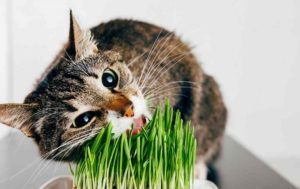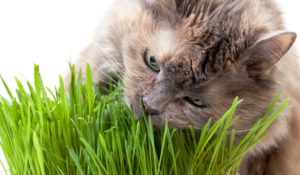Cats are known for their curious and sometimes quirky behaviors, and one of those behaviors is eating grass. It may seem strange to us as humans, but it is actually a common behavior among cats. However, many pet owners have concerns about whether or not this habit is harmful to their feline friends. In this article, we will delve into the reasons behind why cats eat grass, the benefits they may receive from doing so, and whether or not it poses any risks to their health.

Why do cats eat grass?
There are various theories and explanations as to why cats eat grass. From a medical standpoint, it is considered a normal behavior. Many cats have a desire to eat grass and do so frequently. This can be attributed to several reasons:
Species instinct
One of the main reasons why cats eat grass is due to their natural instinct. In the wild, cats consume prey that contains plant material in their stomachs. This plant material aids in digestion and provides essential nutrients. Therefore, it is believed that domestic cats also have this instinct to seek out plants for nutritional purposes.
Supports digestion and eliminates excess substances
Another reason why cats eat grass is to aid in digestion and eliminate excess materials in their digestive system. Cats are obligate carnivores, meaning their diet consists mainly of meat. As a result, they are unable to digest certain components such as bones or fur. Eating grass helps to push these materials through their digestive tract and out of their bodies, providing them with relief and comfort.
Provides essential nutrients
Grass contains essential nutrients that are beneficial for cats. It is a good source of folic acid, which is necessary for the production of hemoglobin in their bodies. Hemoglobin is responsible for transporting oxygen in the blood, so having adequate levels of folic acid is crucial for a cat’s overall health. Additionally, grass also contains other vitamins and minerals that contribute to a healthy diet for cats.
Love the taste and aroma of grass
Lastly, some cats simply enjoy the taste and smell of grass. They may find it appealing and satisfying, leading them to seek it out as a snack. This behavior is similar to how humans have cravings for certain foods, even if they are not necessarily essential for our diets.
Benefits of cats eating grass

As mentioned earlier, there are several benefits that cats can receive from eating grass. Let’s take a closer look at these advantages:
Supports digestion and eliminates excess substances
Eating grass helps to stimulate a cat’s digestive system and aids in eliminating any excess materials that may be causing discomfort. This can include hairballs, bones, or other indigestible components from their diet. By consuming grass, cats are able to relieve themselves of these materials and avoid potential health issues.
Provides essential nutrients
Grass contains essential nutrients such as fiber, vitamins, and minerals that are beneficial for a cat’s overall health. These nutrients help to support their immune system, promote healthy digestion, and maintain a shiny coat. Therefore, by eating grass, cats are able to supplement their diet with these vital nutrients.
Helps reduce stress
Cats are known to be creatures of habit and can become easily stressed or anxious. Eating grass can serve as a form of stress relief for them, similar to how humans may turn to comfort foods when feeling overwhelmed. The act of chewing on grass can help to calm cats and provide them with a sense of comfort.
Is it harmful for cats to eat grass?
Now that we have explored the reasons behind why cats eat grass and the benefits they may receive from doing so, let’s address the main concern of pet owners – is it harmful? The short answer is no, eating grass is not harmful to cats. In fact, it can be beneficial for their health. However, there are a few things to keep in mind:
Grass must be grown in a safe environment
It is essential to ensure that the grass your cat is consuming is safe and free from any potential toxins. This means avoiding areas where pesticides or other chemicals may have been used. It is also important to avoid grass that has been treated with fertilizers or other lawn care products. These substances can be harmful to cats if ingested.
Pay attention to thorny or sharp grasses
Some types of grass may have sharp edges or thorns that can cause harm to a cat’s digestive system. Therefore, it is best to avoid these types of grass and opt for softer varieties instead. If you are unsure about the type of grass in your yard, it is best to consult with your veterinarian before allowing your cat to consume it.
Limit the amount of grass eaten
While grass can be beneficial for cats, it should not make up a significant portion of their diet. It is important to remember that cats are carnivores and require a diet that is high in protein. Therefore, grass should only be considered as a supplement to their regular meals and not a replacement.
Some things to pay attention to when feeding cats grass

If you have decided to allow your cat to eat grass, there are a few things to keep in mind to ensure their safety and well-being:
Choose the right type of grass
As mentioned earlier, it is crucial to choose the right type of grass for your cat to consume. Opt for softer varieties such as wheatgrass or oat grass, which are safe for cats to eat.
Check your cat’s health before feeding him grass
Before allowing your cat to eat grass, it is important to make sure they are healthy and do not have any underlying health issues that may be aggravated by consuming grass. If your cat has a sensitive stomach or digestive problems, it is best to consult with your veterinarian before introducing grass into their diet.
Monitor and check the amount of grass eaten
It is essential to monitor how much grass your cat is consuming. While it is generally safe for them to eat, too much can lead to vomiting or diarrhea. If you notice any changes in your cat’s behavior or health after consuming grass, it is best to limit their intake or consult with your veterinarian.
Conclusion
In conclusion, it is normal and beneficial for cats to eat grass. It helps to aid in digestion, provide essential nutrients, and can serve as a form of stress relief. However, it is crucial to ensure that the grass is safe for consumption and does not make up a significant portion of their diet. By understanding the reasons behind why cats eat grass and taking necessary precautions, we can ensure the health and well-being of our feline friends.
